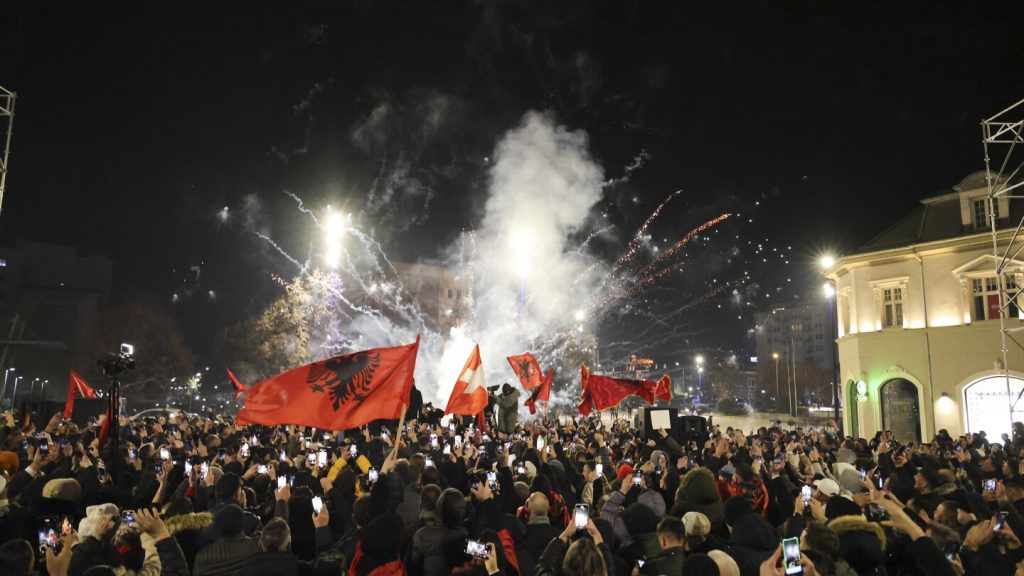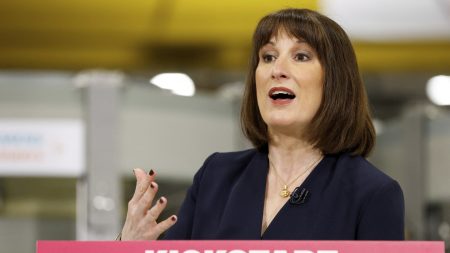Kosovo’s Parliamentary Election Results: A New Chapter in a Challenging Landscape
Overview of the Election and Its Significance
Kosovo’s recent parliamentary election, held on Sunday, marked a pivotal moment in the country’s political landscape. According to preliminary results released Monday, Prime Minister Albin Kurti’s leftist Self-Determination Movement Party, or Vetevendosje!, secured the most seats with 40.94% of the vote. However, this victory fell short of a majority, leaving Kurti’s party in need of a coalition partner to form the next government. This election was particularly significant, as it determines the leadership that will navigate Kosovo through stalled normalization talks with Serbia and address the country’s economic struggles, including the suspension of foreign aid from the U.S. and the European Union.
The vote also represented a milestone in Kosovo’s political history, as it was the first time since the country declared independence in 2008 that a parliament completed a full four-year mandate. Kosovo has held nine parliamentary elections since the end of the 1998-1999 war, which saw ethnic Albanian separatists clash with Serbian forces before NATO intervened to drive the Serbs out. However, Serbia continues to refuse recognition of Kosovo’s independence, maintaining tensions in the region.
Election Results: A Fragmented Political Landscape
With 98% of the votes counted, Vetevendosje! emerged as the leading party, but its 40.94% share of the vote underscores the fragmented nature of Kosovo’s political landscape. The Democratic Party of Kosovo (PDK), whose leaders are currently detained at The Hague on war crimes charges, secured 22.11% of the vote, while the Democratic League of Kosovo (LDK), the country’s oldest party, garnered 17.67%. The Alliance for Kosovo’s Future, led by former Prime Minister Ramush Haradinaj, trailed with 7.44%.
The ethnic Serb minority’s main party, Srpska Lista, won 4.33% of the vote, slightly less than its performance in the previous election. The party’s leader, Zlatan Elek, expressed gratitude to Serbian President Aleksandar Vucic for his support, highlighting the enduring influence of Belgrade over Kosovo’s Serb population.
Kurti, despite his party’s strong showing, remained tight-lipped about potential coalition partners. Addressing journalists, he simply stated, “The people won. Vetevendosje! won. We are the winners who will form the next Cabinet.” His supporters celebrated in the streets, but the challenges ahead were already casting a shadow over the festivities.
Challenges Ahead for Kosovo’s Next Government
Kurti’s new term will be defined by a host of pressing challenges. The government faces a difficult economic situation, exacerbated by the U.S. and EU’s suspension of funding nearly two years ago. With Kosovo’s GDP per capita standing at less than €6,000 ($6,200), it remains one of Europe’s poorest countries. The new administration will need to prioritize raising public salaries and pensions, improving education and healthcare, and combating poverty.
Compounding these domestic concerns is the strained relationship with Western powers. Kurti’s government has drawn criticism for unilateral actions that have heightened tensions with Serbia and Kosovo’s ethnic Serbs. Measures such as the ban on the use of the Serbian dinar and restrictions on dinar transfers to Serb communities have deepened divisions. These actions have prompted calls from the U.S., EU, and NATO’s KFOR stabilization force for restraint, amid fears of renewed interethnic conflict.
Dusan Radakovic, a political analyst in Mitrovica, noted that Kosovo’s ethnic Serbs continue to look to Belgrade for support, hoping that Srpska Lista can play a balancing role in addressing their concerns. With KFOR increasing its presence in Kosovo ahead of the election, the region remains a tinderbox of unresolved tensions.
The Role of the Ethnic Serb Minority in Kosovo’s Politics
The ethnic Serb minority in Kosovo continues to play a significant role in the country’s political dynamics, despite their relatively small size. Srpska Lista, the main party representing Kosovo’s Serbs, won 4.33% of the vote, slightly down from its performance in the previous election. The party’s leader, Zlatan Elek, thanked Serbian President Aleksandar Vucic for his support, underscoring the enduring influence of Belgrade over Kosovo’s Serb population.
Kosovo’s new 120-seat parliament reserves 20 seats for minority groups, including 10 for the Serb minority, regardless of election results. This guaranteed representation ensures that the concerns of Kosovo’s Serbs are heard in the legislature, though the community’s dependence on Belgrade for social services and financial support continues to complicate their relationship with the government in Pristina.
Political analyst Dusan Radakovic noted that many Serbs in Kosovo still have faith in Belgrade and view Srpska Lista as a crucial voice in addressing their challenges. This loyalty to Serbia reflects the broader tensions between Kosovo’s Albanian majority and its Serb minority, which have persisted since the end of the 1998-1999 war.
The International Community’s Role in Shaping Kosovo’s Future
The international community remains a key player in Kosovo’s affairs, as the country grapples with its complex relationship with Serbia and struggles to address its economic and social challenges. The EU’s ambassador to Kosovo, Aivo Orav, emphasized the need for the incoming government to meet the expectations of its citizens, who overwhelmingly associate EU membership with improved living standards, human rights, and the rule of law.
Orav urged the new government to prioritize reforms and actively work towards addressing these priorities. He also reaffirmed the importance of normalizing relations with Serbia, a stance echoed by the U.S. and other Western powers. The normalization process has stalled in recent years, with both sides dug in over issues such as Kosovo’s statehood and the rights of its Serb minority.
The EU, along with the U.S. and NATO’s KFOR mission, has consistently called for restraint and dialogue to avoid renewed conflict. These entreaties take on added urgency amid the broader instability in the region, with Kosovo’s political and economic trajectory hanging in the balance.
Looking Ahead: The Path to Stability and Prosperity
As Kosovo’s political parties navigate the complex coalition-building process, the country’s future hangs in the balance. The next government will face an daunting agenda, from reviving the economy and improving public services to repairing ties with Western allies and advancing the normalization process with Serbia.
The low voter turnout of 40.6%—down 7% from the previous election—suggests a growing disillusionment among citizens, particularly the younger generation, who are increasingly frustrated with the lack of progress on key issues. Addressing these concerns will require bold and inclusive leadership, as well as a commitment to transparency and accountability.
For Kosovo to move forward, the new government must also rebuild trust with the international community. This will involve not only pursuing much-needed reforms but also demonstrating a willingness to engage in constructive dialogue with Serbia. As Ambassador Orav noted, the homework ahead is substantial, but the potential reward—a more prosperous, stable, and integrated Kosovo—is well worth the effort.
In the end, the outcome of this election is not just about the distribution of seats in parliament but about the kind of future Kosovo’s citizens envision for themselves. With challenges aplenty, the road ahead will be difficult, but it also presents an opportunity for Kosovo to write a new chapter in its history—one marked by unity, progress, and hope.








